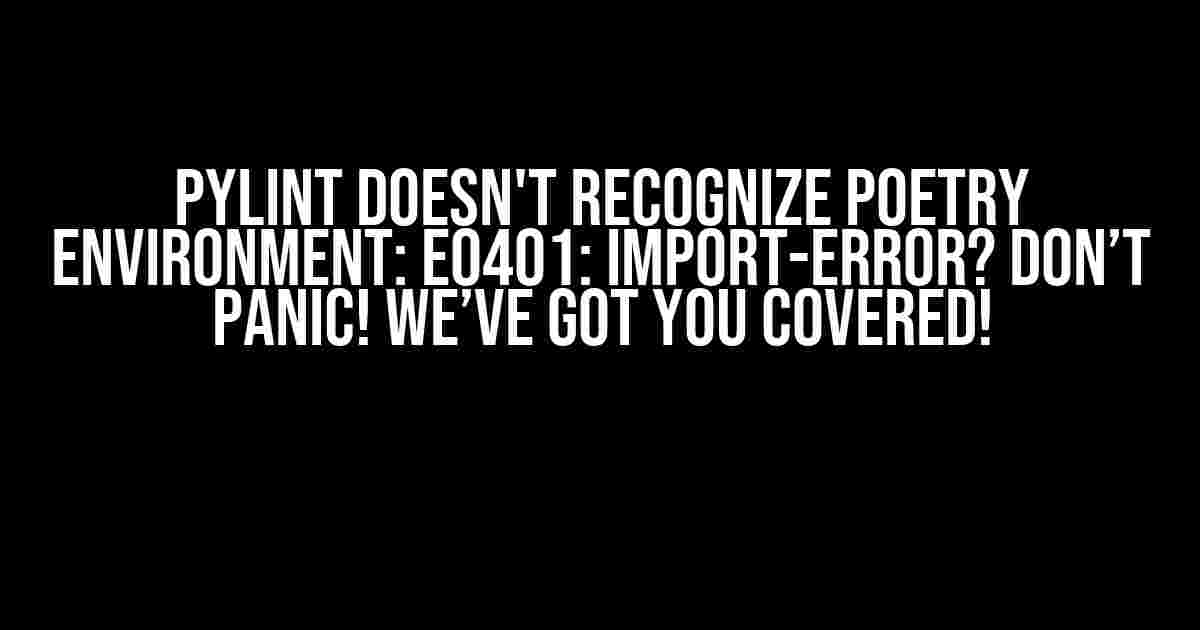If you’re reading this, chances are you’re frustrated with PyLint throwing an “ImportError” when trying to lint your Poetry-managed project. Don’t worry, you’re not alone! In this article, we’ll delve into the issue, explain what’s going on, and provide a step-by-step guide to get PyLint and Poetry playing nice.
The Problem: E0401: Import-Error
When you run PyLint on a Poetry project, you might encounter an error message like this:
************* ModuleE0401: Unable to import 'module' (import-error)
This error occurs because PyLint doesn’t recognize the Poetry environment, which leads to issues with importing modules. But fear not, we’re about to fix this!
Why Does This Happen?
The root cause of this problem lies in how Poetry manages dependencies and Python paths. When you create a Poetry project, it sets up a virtual environment with its own Python interpreter and package manager. This can lead to conflicts with PyLint, which expects a traditional Python environment.
To troubleshoot this issue, you need to understand how Poetry’s environment works and how to configure PyLint to play nice with it.
Step-by-Step Solution
Follow these steps to get PyLint working with your Poetry project:
Step 1: Activate the Poetry Environment
Open your terminal or command prompt and navigate to your project directory. Then, activate the Poetry environment using the following command:
poetry shell
This will activate the virtual environment created by Poetry. You should see the environment name in your terminal prompt.
Step 2: Install PyLint Using Poetry
Make sure PyLint is installed within the Poetry environment using the following command:
poetry add pylint
This will install PyLint and its dependencies within the Poetry environment.
Step 3: Configure PyLint to Recognize the Poetry Environment
Create a `pylintrc` file in the root of your project directory with the following content:
[MASTER] init-hook='import sys; sys.path.insert(0, ".")' [TYPECHECK] typedecorator = yes
This configuration tells PyLint to insert the current working directory (i.e., your project directory) into the Python path. This enables PyLint to find and import your project modules correctly.
Step 4: Run PyLint with the Correct Python Interpreter
To run PyLint with the correct Python interpreter, use the following command:
poetry run pylint
Step 5: Verify the Fix
Rerun PyLint on your module to verify the fix:
poetry run pylint
Troubleshooting Tips
If you still encounter issues, try the following:
- Check that your `pylintrc` file is in the correct location and has the correct content.
- Verify that you’ve activated the Poetry environment using `poetry shell`.
- Ensure that PyLint is installed within the Poetry environment using `poetry add pylint`.
- Try running PyLint with the `–version` flag to verify the correct interpreter is being used:
poetry run pylint --version
Conclusion
PyLint and Poetry can work together harmoniously, but it requires a bit of configuration magic. By following these steps, you should be able to get PyLint recognizing your Poetry environment and importing modules correctly. Remember to activate the Poetry environment, install PyLint using Poetry, configure PyLint, and run it with the correct Python interpreter.
Happy coding, and may your Python code be lint-free and poetry-full!
| Common Issues | Solutions |
|---|---|
| E0401: ImportError | Activate Poetry environment, install PyLint using Poetry, and configure PyLint |
| PyLint not recognizing Poetry environment | Verify `pylintrc` file content and location, and run PyLint with the correct Python interpreter |
| PyLint version issues | Run PyLint with the `–version` flag to verify the correct interpreter is being used |
If you have any further questions or need additional assistance, feel free to ask in the comments below!
Frequently Asked Question
Get rid of that frustrating “PyLint doesn’t recognize Poetry environment: E0401: import-error” and boost your coding experience with these handy Q&As!
What is Poetry, and why is PyLint causing a fuss about it?
Poetry is a Python package manager that makes it easy to manage your project’s dependencies. PyLint, on the other hand, is a static code analyzer that checks your code for errors and styling issues. When PyLint throws an E0401: import-error for a Poetry-managed package, it means it can’t find the package, despite it being installed. This is usually because Poetry uses a virtual environment, and PyLint isn’t aware of it.
How do I tell PyLint about my Poetry environment?
You can configure PyLint to recognize your Poetry environment by creating a `.pylintrc` file in your project’s root directory. Add the following lines to it: `[MASTER] init-hook=’import sys; sys.path.append(“./.venv/lib/python3.x/site-packages”)’`. This tells PyLint to include your Poetry-managed packages in its search path. Replace `3.x` with your Python version.
What if I’m using a virtual environment with Poetry, and PyLint still doesn’t recognize it?
If you’re using a virtual environment with Poetry, try running PyLint with the `–init-hook` option, like this: `pylint –init-hook=’import sys; sys.path.append(“/path/to/your/virtual/env/site-packages”)’ your_file.py`. This sets the correct path for PyLint to find your Poetry-managed packages.
Can I use a PyLint plugin to solve this issue?
Yes, you can use the `pylint-poetry` plugin, which is specifically designed to handle Poetry-based projects. Install it using `pip install pylint-poetry`, and then run PyLint with the `–load-plugins` option: `pylint –load-plugins=pylint_poetry your_file.py`. This plugin will take care of setting up PyLint to work with your Poetry environment.
What if none of these solutions work, and I’m still stuck with the E0401 error?
Don’t panic! Try reinstalling Poetry and your dependencies, and then re-run PyLint. If the issue persists, check your `.pylintrc` file for any syntax errors or inconsistencies. You can also try running PyLint with the `–verbose` option to get more detailed output. If all else fails, seek help from the PyLint or Poetry communities, or consider filing a bug report.


